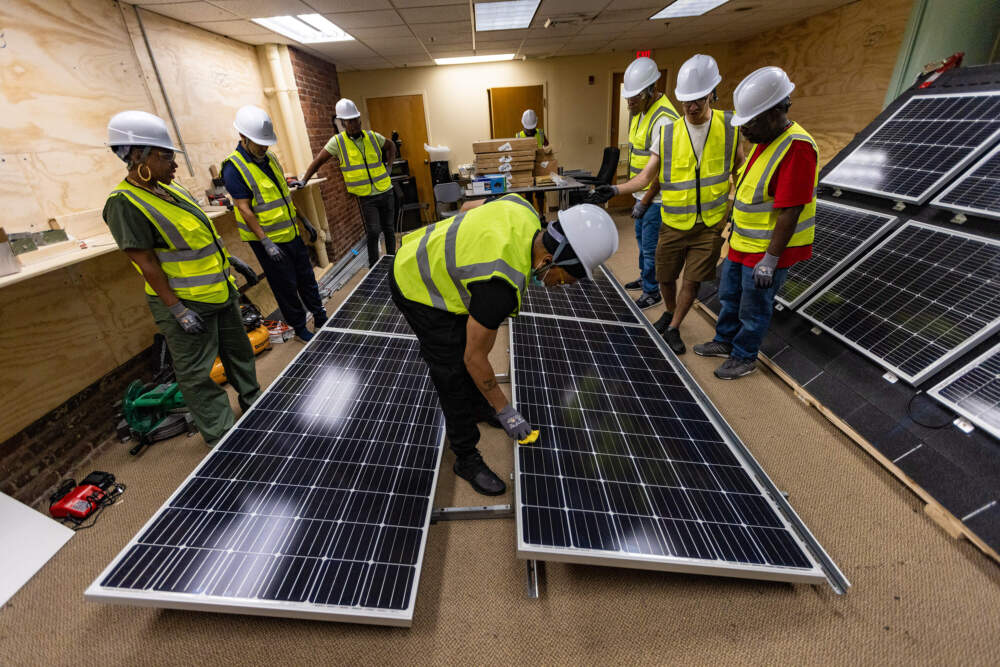
The solar trade industry in Boston and the broader New England region is experiencing significant growth and transformation as we approach 2025. While Boston is actually located in Massachusetts rather than New Hampshire, the entire region is seeing increasing opportunities in solar and clean energy jobs, including solar photovoltaic (PV), battery energy storage (BES), and energy efficiency sectors 1. The solar industry has been a major source of job creation, with over 12,000 new jobs added nationally in 2022 alone, and employment of solar photovoltaic installers is projected to grow by 48% nationally from 2023 to 2033 23. In Boston and surrounding areas, solar installers typically earn salaries ranging from $50,000 to $65,000 annually, with opportunities for career advancement and specialization 4. To enter this growing field, individuals typically need to complete 600 hours of electrical training through an approved apprenticeship program and obtain an electrician license, which is required for solar installation work in New Hampshire 5. With the right training and certification, aspiring solar professionals can take advantage of the expanding clean energy economy in the Boston area and beyond.


Before diving into the steps to becoming a solar trade professional, it's essential to understand what this career entails. Solar trade professionals are skilled technicians who design, install, and maintain solar energy systems for residential, commercial, and industrial applications. This includes working with solar photovoltaic (PV) panels, energy storage systems, and related electrical components to create sustainable energy solutions. The work involves both technical knowledge of electrical systems and physical labor, as installers must often work on rooftops or in outdoor environments. As the clean energy transition accelerates, solar trade professionals play a crucial role in reducing carbon emissions and helping communities achieve energy independence. With the solar industry projected to grow by 48% nationally from 2023 to 2033, this career path offers strong long-term prospects 3.
Yes, to work as a solar trade professional in New Hampshire, you must obtain an electrician license, as solar installation work falls under electrical trades. The licensing process requires completing 600 hours of training through an approved electrical apprenticeship or training program 45. This requirement ensures that solar installers have the necessary knowledge of electrical systems and safety protocols to perform installations correctly. While Boston is actually located in Massachusetts, the licensing requirements for solar professionals are similar across the New England region. In Massachusetts, solar installers must also be licensed electricians or work under the supervision of one. Understanding New Hampshire's Renewable Portfolio Standard (RPS) statutes under RSA 362-F is also important, as these regulations govern renewable energy sources and facility eligibility for state energy goals 63.
To begin your career in the solar trade industry, you'll need to find the right training program that meets the licensing requirements. In New Hampshire and the surrounding region, several educational options are available to prepare for a career in solar energy:
| Program/Institution | Location | Focus | Format |
|---|---|---|---|
| UNH Community Solar Development | University of New Hampshire (online) | Training to develop community solar projects | Free, instructor-led online |
| The Possible Zone Clean Energy Deep Dive | Boston (Jamaica Plain area) | Hands-on clean energy and solar technology learning | Experiential learning |
| New Hampshire Rural Renewables (NHRR) | New Hampshire rural areas | Technical assistance and support for solar technology | Free technical assistance |
| New England Colleges Collaborative Solar Initiative | Various in New England (MA, ME, NH) | Institutional solar projects supporting sustainability | College partnership projects |
To find training programs and apprenticeship opportunities:
These programs provide the foundational knowledge and practical experience needed to succeed in the solar trade industry.
The path to becoming a solar trade professional in Boston, NH involves several key steps that combine education, hands-on training, and certification:
To begin your journey in the solar trade industry, you should:
In New Hampshire, becoming a solar installer requires completing 600 hours of electrical training through an approved apprenticeship or training program 45. This training covers essential topics such as:
After completing your training, you'll need to obtain an electrician license to legally perform solar installation work in New Hampshire. The licensing process typically involves:
Once licensed, you can begin working as a solar trade professional, gaining valuable hands-on experience. Many solar companies offer on-the-job training to help new installers develop specialized skills in:
To enhance your career prospects and earning potential, you may want to pursue additional certifications such as:
These steps provide a clear pathway to establishing yourself as a qualified solar trade professional in the Boston, NH area.

The job market for solar trade professionals in Boston and the surrounding New England region has experienced significant fluctuations in recent years but shows strong growth potential through 2025 and beyond. The solar industry faced a 38% national job loss in 2020 due to the pandemic, with Massachusetts experiencing a 52% decline in its solar workforce compared to previous projections 7. However, the sector has been recovering steadily, with utility-scale solar jobs increasing by 6.8% and residential market jobs by 6.3% by 2023 4. Looking ahead, the occupational outlook remains highly positive, with employment of solar photovoltaic installers projected to grow by 48% nationally from 2023 to 2033, much faster than the overall job market 3.
In terms of compensation, solar trade professionals in the Boston area typically earn salaries ranging from $50,000 to $65,000 annually, with variations based on experience, specialization, and specific location within the region 4. This compares favorably to other major U.S. cities, with Boston installers earning salaries comparable to those in New York City, while Midwest cities like Chicago typically offer salaries in the range of $42,000 to $52,000 annually 4. Benefits for solar trade workers tend to align with industry standards and may include health insurance, retirement plans, and paid time off, though specific packages vary by employer.
| Region | Salary Range (Annual) | Key Factors Influencing Pay |
|---|---|---|
| Boston, MA | $50,000 - $65,000 | High energy costs, strong state incentives |
| New York City | $50,000 - $65,000 | Similar market dynamics to Boston |
| Chicago, IL | $42,000 - $52,000 | Lower cost of living, less aggressive solar incentives |
The strong market demand for solar energy solutions, driven by rising electricity costs and increasing environmental awareness, continues to create new opportunities for skilled professionals in this field.
Several key factors are driving the growth of solar trade careers in the Boston area and the broader New England region. One of the most significant drivers is the surging market demand, with Boston Solar achieving over $9.1 million in new sales in Q1 2025 alone, including $5 million from residential and $3.9 million from commercial sectors 47. This strong demand is fueled by rising electricity costs in Massachusetts, which have made solar energy an increasingly attractive alternative for both homeowners and businesses 6. Additionally, operational efficiency improvements have allowed solar companies to reduce overhead and project completion times, increasing the volume of installations and creating more job opportunities 4.
However, individuals entering the solar trade industry also face several challenges. One of the most significant is interconnection delays, with Massachusetts experiencing approval times of two to five years for larger projects (≥1 MW) and two to six months for smaller projects 6. New Hampshire developers have also reported delays caused by utility companies like Eversource 5. Other challenges include permitting and siting obstacles, declining incentives under programs like Massachusetts' SMART program (which has seen a 72% decline in newly installed capacity from 2022), and regulatory uncertainty regarding net metering policies 463.
To overcome these challenges, industry stakeholders recommend several strategies:
By understanding both the drivers of growth and the challenges facing the industry, aspiring solar trade professionals can better position themselves for success in this dynamic field.
Starting a career in the solar trade industry in Boston, NH offers exciting opportunities in a rapidly growing field. As the clean energy transition accelerates, the demand for skilled solar professionals continues to rise, with employment of solar photovoltaic installers projected to grow by 48% nationally from 2023 to 2033 3. The Boston area, with its strong market demand and supportive policy environment, provides an excellent foundation for building a successful career in this industry. Whether you're just finishing high school or considering a career change, following the steps outlined in this guide will set you on the path to success in the solar trade profession.
To begin your journey:
As you gain experience and build your credentials, the opportunities in the solar trade industry will continue to grow. With the right training, certification, and determination, you can establish yourself as a valuable professional in this exciting and impactful field. Good luck on your journey into the solar trade industry!
https://palmetto.com/policy/solar-jobs-a-look-at-the-next-great-american-indusry ↩
https://irecusa.org/programs/solar-jobs-census/ ↩ ↩2 ↩3 ↩4 ↩5 ↩6 ↩7 ↩8 ↩9
https://www.irecusa.org/census-solar-jobs-by-state/ ↩ ↩2 ↩3 ↩4
https://seia.org/research-resources/solar-industry-research-data/ ↩ ↩2 ↩3 ↩4
https://www.wbjournal.com/article/solar-power-growth-jobs-decline-during-pandemic ↩ ↩2 ↩3

